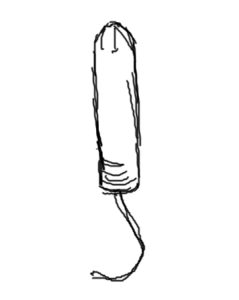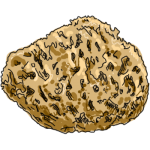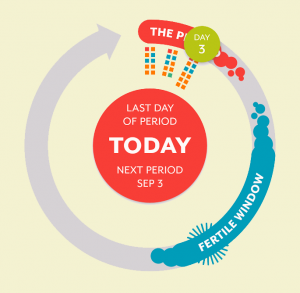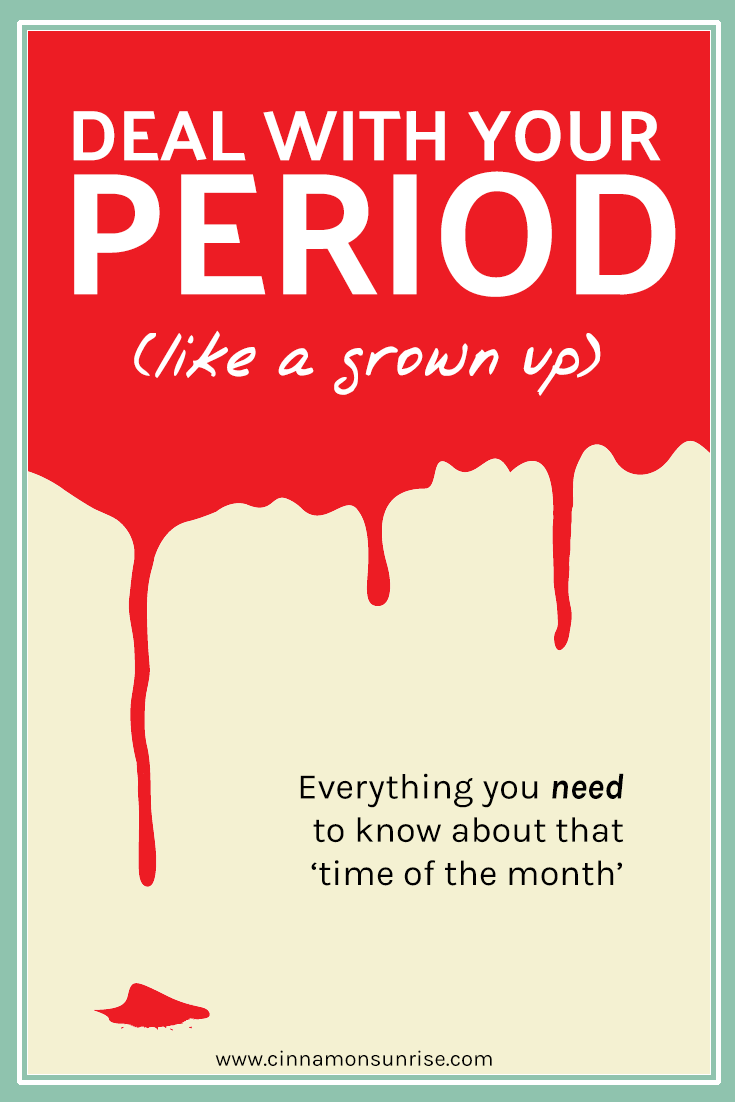This post may contain affiliate links. If you click on an affiliate link and buy something, I get a percentage of the sale. Find out more by reading my affiliate policy and disclosure.
Periods. Don’t you just love them? They are so convenient, so pleasant, and always, somehow, so timely
Yeah. No.
My period started two days ago. So, I decided to dedicate this post to everything you could ever want to know about dealing with your period.
Buckle in folks, this is a long one.
A brief overview of different ways to deal with the blood
There are several different options for absorbing/collecting period blood. The right one for you will change at different times in your cycle, and at different times in your life.
Disposable options
Disposable options are things you buy every month, use once and then toss. They thus become quite expensive when you add it up over time. They also carry an environmental cost.
But, disposable options are easy to use and you don’t have to worry about cleaning them.
 Sanitary Towels – probably the simplest way of dealing with period blood. All you do is stick a pad into your underwear. The super-sized ones with wings are useful at night to help prevent leaks.
Sanitary Towels – probably the simplest way of dealing with period blood. All you do is stick a pad into your underwear. The super-sized ones with wings are useful at night to help prevent leaks.
They can be bulky, especially if you need a thicker pad with more absorbency. You can’t use them when swimming.
 Tampons – more discreet than towels. Can be used while swimming.
Tampons – more discreet than towels. Can be used while swimming.
Carry a small risk of causing toxic shock syndrome, especially if left in for too long, or if you use a ‘super absorbent’ tampon. You can reduce the risk by changing tampons every 4-8 hours, and using the lowest absorbency tampon you can get away with.
If you have a heavy flow, you can combine a tampon and sanitary towel.
Reusable options
Reusable options often have a higher initial cost, but over time they save you money. They are better for the environment as well!
 Cloth towels – you can make these yourself fairly easily if you are good with a needle. Otherwise, you can buy packs online.
Cloth towels – you can make these yourself fairly easily if you are good with a needle. Otherwise, you can buy packs online.
They can feel bulky, especially if you have a heavy flow.
You clean them by soaking in cold water before washing them (which can cause problems when travelling). Despite that, this is my preferred option.
 Menstrual cup – a silicone or rubber cup that collects the blood. Easier to clean and store than reusable sanitary towels.
Menstrual cup – a silicone or rubber cup that collects the blood. Easier to clean and store than reusable sanitary towels.
If you’re comfortable putting in a tampon, this is a fantastic eco-friendly alternative. Brands include the Mooncup, the Diva Cup, Meluna etc. If you are allergic to latex, you will want the silicone version.
 Period panties or boxers – underwear that is designed to absorb menstrual blood. You can wash them in a washing machine.
Period panties or boxers – underwear that is designed to absorb menstrual blood. You can wash them in a washing machine.
Do a search for ‘period panties’ or ‘period boxers’ – there’s lots of companies out there such as Thinx, Lunapads, and Pyramid Seven providing these.
I haven’t used them, but if anyone who has wants to recommend a particular style or brand please leave us a comment 🙂
 Sea sponges – marketed as a ‘natural’ alternative to tampons. Sea sponges can contain yeast, mould, dirt and bacteria. As such, they can cause toxic shock syndrome. Also, bits of the sponge can break off when it’s inside your vagina.
Sea sponges – marketed as a ‘natural’ alternative to tampons. Sea sponges can contain yeast, mould, dirt and bacteria. As such, they can cause toxic shock syndrome. Also, bits of the sponge can break off when it’s inside your vagina.
Basically, don’t use sea sponges
How to deal with a leak
At some point, you will experience a leak. Getting blood out of things can be frustrating. Here are some different things to try:
- Get blood out of clothes
- Get blood out of a mattress
- Get blood out of upholstery
- Get blood out of carpet
- Get blood out of leather
How to deal with period cramps
 Period cramps can hurt a lot. (In fact, cramps can hurt as much as a heart attack).
Period cramps can hurt a lot. (In fact, cramps can hurt as much as a heart attack).
Cramps are caused by the womb shedding its lining. When the womb contracts, it compresses blood vessels lining your womb which cuts off the oxygen and causes pain. At the same time, chemicals called prostaglandins are released which cause more cramping. Some people produce higher amounts of prostaglandins, which causes more painful periods.
The most effective over-the-counter painkillers for period cramps are ibuprofen or aspirin. These reduce the amount of prostaglandins.
Other ways to reduce period cramps:
- Exercise such as swimming, walking or cycling.
- Using a heat pad or hot water bottle on your tummy.
- A warm bath or shower.
- Gentle massage of your abdomen.
- A TENS machine*. Mild electrical pulses are delivered to the abdomen. This interrupts pain signals sent to the brain.
If the pain is severe, or you are experiencing more pain than is normal for you, talk to your GP. There are several ways your GP can help you:
- They can advise on methods of reducing the pain. The hormonal coil is often recommended as a way to reduce cramps and bleeding. Some types of contraception prevent you from having a period at all. (Equally, some forms of birth control can make your periods more painful. The non-hormonal IUD, for example, is known to cause heavier periods with more intense cramping.)
- They can prescribe stronger painkillers if needed.
- Finally, they can help determine if there is an underlying condition such as endometriosis that is making your period more painful than it should be.
How to deal with period bloating
Fluctuating hormones during the menstrual cycle can cause fluid retention (and other fun side effects like constipation). There’s not much you can do about your hormones without recourse to a hormonal form of birth control.
However, there are a few steps you can take to limit the amount of bloating.
- Reduce the amount of salt you eat before your period. Salt causes fluid retention as well, so it compounds the problem.
- Drink lots of water. This may seems counterintuitive.
However, dehydration causes your body to retain water. In addition, drinking lots of water can help prevent constipation. - Eat pineapple. Pineapples contain the enzyme bromelain, which helps break down proteins and reduces bloating.
- Avoid foods that give you gas. These can include dairy, beans and pulses, broccoli, cabbage etc. Instead, eat leafy greens such as kale, spinach and collard greens.
- Drink peppermint tea. Many people believe that peppermint has some anti-spasmodic properties which can relieve both cramps and bloating. (As with all herbal remedies, peppermint tea can cause side effects. Read up on peppermint tea here.)
How to deal with period cravings
Just before your period, your cortisol levels can rise, and your serotonin levels dip. This can put you in a bad mood – and cause you to crave carbohydrates, chocolate and sugar.
- Eat a breakfast high in protein and some good fats. Greek yogurt with fruit, eggs on toast, or scrambled eggs with spinach are all good options.
- Make an avocado chocolate pudding. Plant based, vegan, full of good fats yet sweet, creamy and chocolatey. What could be better?
- Exercise. Exercise boosts serotonin, so reduces cravings! Win win!
- Eat complex carbohydrates such as brown rice, baked sweet potatoes, or porridge. Try and do that when you know a period is on its way, before the cravings reach CHOCOLATE CAKE OR NOTHING levels.
- And of course… eat the thing you want, and enjoy it. If you really want a slice of cake: get it, and make the most of it. Put it on your prettiest plate. Light some candles. Savour every mouthful. Lick your spoon and glory in a world that contains such sublime joys. #joyfuleating
How to deal with fatigue during your period
Feeling utterly exhausted when on your period is common. As always, talk to your GP if it’s a lasting issue. In the meantime here are a few pointers:
- Blood loss can lead to anaemia (lack of iron). This is easy to test for, and easy to fix, so definitely talk to a doctor about it! I had border-line anaemia for a while. I now use the Iron Fish, and make a point of boiling it up for some lemon and ginger tea during that time of the month.
- Disturbed sleep. Getting up to change your menstrual protection, take painkillers or because you have cramping can all leave you tired. If you are worried about leaks, experiment with different forms of protection. Try combining period underwear with a sanitary towel for example. To avoid getting struck by cramps after going to bed, try taking ibuprofen about half an hour before you go to sleep and take a hot water bottle to bed with you.
- Dehydration is an issue if you have a lot of fluid retention and can make you tired. Easy solution: drink more water.
How to deal with period related migraines (and a note about migraines and birth control)
For some people, a fall in levels of oestrogen can trigger a migraine. If this is the case, you will get a migraine during or just before your period. A menstrual migraine is a specific condition. It is linked to the menstrual cycle, you won’t experience a migraine ‘aura’, and it can last longer than other kinds of migraines.
You can find more information at The Migraine Trust. There are a few treatment options available, so don’t feel like you have to just suffer each month.
If you have experienced a migraine with an aura, you should tell the person who prescribes your birth control. People who experience migraine with aura are advised not to use the combined contraceptive pill.
Migraines can be triggered by stress, poor sleep, and changes in diet so it’s important to try and stick to your regular routine as much as possible.
How to track your period (and a note about irregular periods)
 A useful thing to do is to track your cycle and associated symptoms. This helps you know where you are in your cycle, which helps you plan. Thus you are less likely to end up stranded in dire need of a tampon with none available.
A useful thing to do is to track your cycle and associated symptoms. This helps you know where you are in your cycle, which helps you plan. Thus you are less likely to end up stranded in dire need of a tampon with none available.
Also, tracking your period can help alert you to anything unusual, such as changes in duration, intensity or symptoms such as unusual discharge.
There are a lot of trackers out there. A simple option is to record it in your existing diary or planner. My own personal preference is to use Clue. Clue is an app for your smartphone that makes it easy to track symptoms and spot trends over time. I like it because it’s not gendered, it’s easy to use, and you can pick which things you want to track.
Irregular periods are common when you first start menstruating, and when you reach menopause. In addition, changing your method of contraception often disrupts your regular cycle and it can take a few months to stabilise again.
However, ongoing irregular periods can be a symptom of an underlying illness such as polycystic ovary syndrome (PCOS). It’s best to talk to either your GP or a nurse at a sexual health clinic if you have any concerns about your period.
… And finally, a note about herbal remedies for period symptoms
If you start to research any particular period symptom, you’ll find a bunch of blogs and websites talking about supplements such as evening primrose oil, chaste berry, burdock etc
Herbal treatments are often lauded as being ‘safe’ and ‘natural’ ways to ‘balance your hormones’. People take them because they think they can’t hurt.
However, if a herb is capable of acting as a medicine, then it is capable of affecting a change upon your body. Many herbal medicines interact with other medicines, and with each other. For example: St John’s Wort can prevent the Pill from working effectively, and increase your risk of pregnancy. Vitamin E supplements can interact with medicines such as Coumadin and increase the risk of stroke.
In addition, many herbal medicines and supplements are unregulated. This means there are no quality standards in manufacturing and your supplement could include anything.
There are a few ways you can make use of herbal remedies without opening yourself up to risk:
 Look for a Traditional Herbal Registration (THR) marking on the package. This means it meets safety standards, and includes information about how to take the herb safely.
Look for a Traditional Herbal Registration (THR) marking on the package. This means it meets safety standards, and includes information about how to take the herb safely.- Get advice from a NIMH accredited herbalist. These herbalists have been educated to degree standard with an accredited organisation.
- Always talk to your GP or health care provider about any herbal medicines you are taking. If you are currently taking any prescription medication, get advice from your GP about possible interactions before taking any herbal supplements.
And that, folks, is my 2,000 word post about periods. If you made it to the end… well done 🙂 Let me know what you think – and if you think there’s anything missing!
You can find more information about periods at the NHS, at Hello from Clue, and at RCOG.

Great read thanks for the advice
Thanks for taking the time to comment 🙂